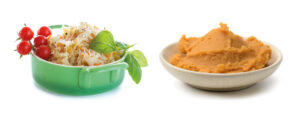Given the rapid rise in kombucha tea, kefir milk, sauerkraut, and probiotic products, it’s pretty clear that gut health is on everyone’s mind. Registered dietitian, Linia Patel, tells us more about this upward trend.
What is fermentation?
Fermentation is the process in which live bacteria and yeasts are encouraged to grow in foods. As they grow, they break down carbohydrates and create acids that keep the food from spoiling. The process of fermentation has been practised for many years all around the world as a form of preservation.
Examples of fermented foods are:
- Plain yogurt with ‘live bio-active cultures’
- Sauerkraut
- Korean kimchi
- Miso (fermented soy paste)
- Kefir
- Kombucha
- Pickles and other fermented vegetables (in the refrigerated section, not in vinegar)
- Tempah
- Sourdough bread, injera (Ethiopian flat bread), dosa (Indian rice and lentil flat bread)
Are fermented foods healthy?
Fermented foods can be part of a healthy, balanced and varied diet. Some fermented foods offer specific benefits such as:
Reduced lactose content – if you struggle to digest milk due to the lactose, you may find that you are able to digest yogurt and some cheeses
Rich in probiotics – these micro-organisms help keep a healthy balance of bacteria in the gut
Contains acetate – fermented foods contain by-products of fatty acid fermentation such as acetate, which is a short-chain fatty acid known to deliver a host of health benefits as it acts as an intermediate between our gut microbiome and the rest of our body
Lower glycaemic index – fermented grain products, such as sourdough bread, not only release sugar slower into the blood stream but have increased vitamins and minerals; fermenting can decrease the compounds that bind minerals, making them easier for our bodies to absorb
What does the science say?
There is some evidence that fermented foods are associated with healthier blood lipid levels, improved glucose control and improved digestion; however, it’s important to not get too caught up in the hype as this area is evolving and there is a lot we still don’t know. We need more randomised controlled trials (the top quality of scientific evidence) on specific fermented foods so that we can better understand the health benefits and also the mechanisms involved.
It’s important to remember that, if you are looking to reduce your sodium intake, fermented foods (due to the addition of salt to prevent the growth of harmful bacteria) are very often high in sodium. They can also be high in sugar. Kombucha tea, for example, is made by combining tea with a good mix of bacteria and yeast, and the third essential ingredient is sugar. However, when it comes to commercially made kombucha, the amount of sugar will vary greatly. Some manufacturers will add in extra sugar to make it taste better. So, with this in mind, remember it is always good to check the nutrition label. Food safety must also be considered if you are making your own fermented foods at home.

Including fermented food in your diet
Fermented foods are not magical, but then again… there isn’t a single food or drink item that will ever be. In saying that, fermentation has been around for centuries and what we know so far from the research is that there could be many health benefits. No need to go all fancy and break the bank with kombucha supplies though; begin by adding a small serving of fermented foods to your diet on a daily basis. This could be in the form of bio-live yogurt to begin with. As you get more adventurous, try other food and drink. As with many things, variety is key. As long as you are aware of the sugar and salt that comes with fermented foods, as far as I’m concerned, fermented foods get the thumbs up from me. As does aiming to eat at least 30 different plant-based foods a week.
Being a fan of variety in your diet, I would encourage you to boost your gut health with foods such as those listed here.
Bio-live yogurt – don’t underestimate this breakfast staple; yogurt contains live and active cultures of lactobacillus bacteria that help keep your bad bacteria in check, and Greek yogurt is a good source of protein and calcium
Miso – a paste made from fermented soybeans, which is commonly used as the star ingredient in miso soup, and like other soy foods, miso is a good course of copper – a mineral with antioxidant properties
Tempeh – made from fermented soybeans, tempeh is high in protein but also contains a good whack of probiotics; it’s a versatile protein source that soaks up flavour, so a good meat alternative in stir-fries and curries
Pickles – if you are the kind of person that likes to steal pickles off other people’s plates, then you are likely to be getting a nice dose of probiotics and fibre with your burger as pickles are also high in vitamins A and K, but don’t overdo it as they tend to be high in salt, too
Sauerkraut – produced as a result of lactic acid fermentation, sauerkraut is an excellent source of probiotics, fibre and iron
Kimchi – a Korean cuisine staple that is made from fermented vegetables such as cabbage and radish, seasoned with chilli powder, ginger and garlic; Kimchi is loaded with vitamins A, B and C and also with the ‘healthy bacteria’ called lactobacilli
About the author
Linia Patel has a BSc degree in biochemistry and physiology. Since graduating in 2006, Linia has become a leading dietitian and sports nutritionist. She is currently a PhD candidate in public health. Her passion is translating nutritional science into easy-to-digest and practical advice.







